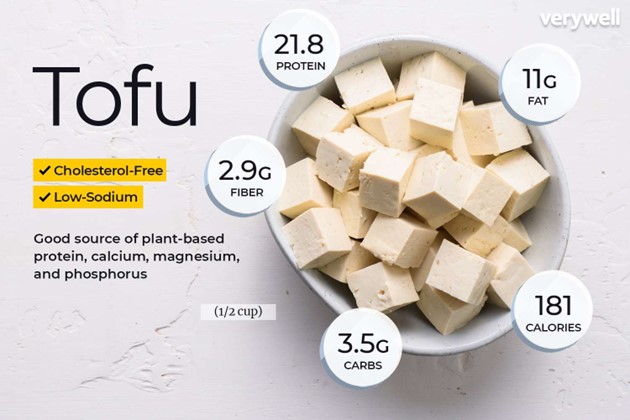A nurse is caring for a client who is at 12 weeks of gestation and is prescribed a high-protein diet. Which of the following foods should the nurse recommend as containing the highest amount of protein?
One cup of oatmeal.
One cup of tofu.
One cup of brown rice.
One cup of kale.
The Correct Answer is B
Choice A reason:
One cup of oatmeal - Oatmeal is a nutritious food, but it does not contain as high a protein content as some other options. While it offers some protein, it is not the best choice for a high-protein diet during pregnancy. Oatmeal is primarily known for its fiber content and complex carbohydrates, which provide sustained energy.
Choice B reason:
 One cup of tofu - Tofu is an excellent source of protein and is a suitable choice for a high- protein diet during pregnancy. Tofu is made from soybeans and is rich in plant-based proteins, making it an ideal option for individuals following a vegetarian or vegan diet as well. Additionally, tofu contains essential amino acids, iron, calcium, and other nutrients beneficial for both the mother and the developing fetus.
One cup of tofu - Tofu is an excellent source of protein and is a suitable choice for a high- protein diet during pregnancy. Tofu is made from soybeans and is rich in plant-based proteins, making it an ideal option for individuals following a vegetarian or vegan diet as well. Additionally, tofu contains essential amino acids, iron, calcium, and other nutrients beneficial for both the mother and the developing fetus.
Choice C reason:
One cup of brown rice - While brown rice is a healthy whole grain and provides some protein, it does not have as high a protein content as tofu. Brown rice is a good source of complex carbohydrates, fiber, vitamins, and minerals, but it may not meet the high protein requirements of a pregnant woman's diet.
Choice D reason:
One cup of kale - Kale is a nutritious leafy green vegetable, but it does not offer a significant amount of protein compared to tofu. It is rich in vitamins, minerals, and antioxidants, making it a valuable addition to a balanced diet. However, for a high-protein diet during pregnancy, other options like tofu are more suitable.
Nursing Test Bank
Naxlex Comprehensive Predictor Exams
Related Questions
Correct Answer is ["A","B","C"]
Explanation
Choice A reason: The nurse should plan to ask the client to empty their bladder before performing Leopold maneuvers. The rationale behind this is to ensure that the client's bladder is empty to allow for better palpation of the uterus and fetal position. A full bladder can interfere with accurate assessment and may lead to incorrect findings during the examination.
Choice B reason:
The nurse should assist the client into a left-lateral position. This position is ideal for performing Leopold maneuvers because it helps to displace the uterus away from the vena cava, reducing the risk of supine hypotension syndrome. Moreover, the left-lateral position promotes optimal blood flow to the placenta, which is essential for the well-being of the fetus during the examination.
Choice C reason:
The nurse should apply an external fetal monitor to the client's abdomen after completing the Leopold maneuvers. The purpose of Leopold maneuvers is to determine the fetal position and presentation manually. Once this information is obtained, applying the external fetal monitor allows continuous monitoring of the fetal heart rate and uterine contractions to assess the baby's well-being and the progression of labor.
Choice D reason:
The nurse should not instruct the client to perform nipple stimulation when planning to assist with Leopold maneuvers. Nipple stimulation is a method to induce or augment labor, and it is not related to the process of assessing fetal position and presentation using Leopold maneuvers. It may lead to unnecessary contractions and confusion during the examination.
Correct Answer is A
Explanation
Choice A reason:
The nurse's priority in this situation is the respiratory rate of 10/min. A respiratory rate of 10 breaths per minute is significantly low and could indicate respiratory depression, especially if the patient is receiving morphine, which is known to depress the respiratory system. This could lead to inadequate oxygenation, potential hypoxia, and other life-threatening complications.
Choice B reason:
Bladder distention may be a concern, but it is not the nurse's priority in this situation. Bladder distention can cause discomfort and urinary retention, but it is not an immediate life- threatening condition compared to potential respiratory depression.
Choice C reason:
A blood pressure of 108/64 mm Hg is within the normal range for an adolescent and may not be the nurse's priority at this time. Although it should be monitored, it does not pose an immediate threat to the patient's life.
Choice D reason:
Nausea and vomiting are common side effects of morphine administration, but they are not the nurse's priority in this situation. While they can cause distress and discomfort to the patient, they are not life-threatening conditions.
Whether you are a student looking to ace your exams or a practicing nurse seeking to enhance your expertise , our nursing education contents will empower you with the confidence and competence to make a difference in the lives of patients and become a respected leader in the healthcare field.
Visit Naxlex, invest in your future and unlock endless possibilities with our unparalleled nursing education contents today
Report Wrong Answer on the Current Question
Do you disagree with the answer? If yes, what is your expected answer? Explain.
Kindly be descriptive with the issue you are facing.
